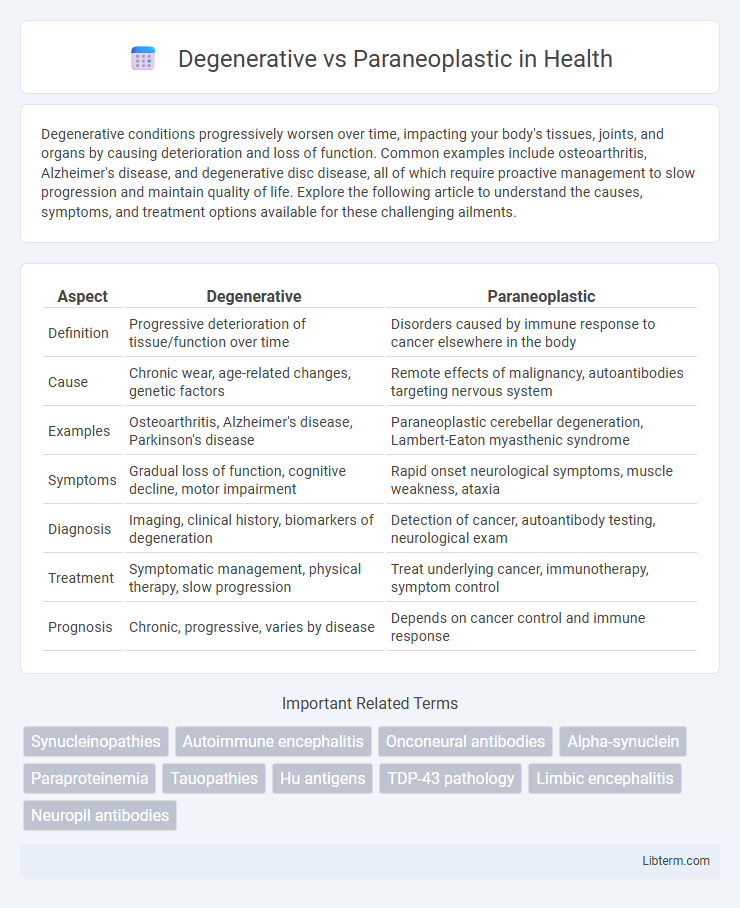Degenerative conditions progressively worsen over time, impacting your body's tissues, joints, and organs by causing deterioration and loss of function. Common examples include osteoarthritis, Alzheimer's disease, and degenerative disc disease, all of which require proactive management to slow progression and maintain quality of life. Explore the following article to understand the causes, symptoms, and treatment options available for these challenging ailments.
Table of Comparison
| Aspect | Degenerative | Paraneoplastic |
|---|---|---|
| Definition | Progressive deterioration of tissue/function over time | Disorders caused by immune response to cancer elsewhere in the body |
| Cause | Chronic wear, age-related changes, genetic factors | Remote effects of malignancy, autoantibodies targeting nervous system |
| Examples | Osteoarthritis, Alzheimer's disease, Parkinson's disease | Paraneoplastic cerebellar degeneration, Lambert-Eaton myasthenic syndrome |
| Symptoms | Gradual loss of function, cognitive decline, motor impairment | Rapid onset neurological symptoms, muscle weakness, ataxia |
| Diagnosis | Imaging, clinical history, biomarkers of degeneration | Detection of cancer, autoantibody testing, neurological exam |
| Treatment | Symptomatic management, physical therapy, slow progression | Treat underlying cancer, immunotherapy, symptom control |
| Prognosis | Chronic, progressive, varies by disease | Depends on cancer control and immune response |
Understanding Degenerative Diseases
Degenerative diseases involve progressive deterioration of cells and tissues, particularly affecting the nervous system, such as Alzheimer's, Parkinson's, and amyotrophic lateral sclerosis (ALS). These conditions result from cellular damage, genetic factors, or environmental influences, leading to loss of function and structural integrity over time. Understanding the pathological mechanisms, including protein aggregation and neuroinflammation, is crucial for differentiating degenerative diseases from paraneoplastic syndromes, which are immune-mediated responses triggered by underlying malignancies.
Defining Paraneoplastic Syndromes
Paraneoplastic syndromes are a group of disorders triggered by an abnormal immune response to a neoplasm, often manifesting remote effects not directly caused by tumor invasion or metastasis. Unlike degenerative diseases, which involve progressive deterioration of specific tissues or organs due to intrinsic pathological processes, paraneoplastic syndromes arise from tumor-secreted substances or immune cross-reactivity affecting various organ systems. These syndromes can lead to neurological, dermatological, or endocrine symptoms, serving as crucial markers for underlying malignancies such as small cell lung carcinoma or breast cancer.
Key Differences Between Degenerative and Paraneoplastic Processes
Degenerative processes primarily involve progressive cellular deterioration and tissue loss due to aging or chronic conditions, often affecting the nervous system or joints. Paraneoplastic processes arise from an immune response triggered by an underlying malignancy, leading to remote effects not directly caused by tumor invasion or metastasis. Key differences include etiology, with degenerative diseases caused by intrinsic cellular failure, and paraneoplastic syndromes driven by cancer-induced autoimmunity, influencing diagnosis and treatment strategies.
Common Causes of Degenerative Disorders
Degenerative disorders primarily result from factors such as aging, genetic mutations, oxidative stress, and chronic inflammation, leading to progressive loss of structure or function in tissues like the nervous system. Common causes include neurodegenerative diseases such as Alzheimer's, Parkinson's, and Huntington's, where protein misfolding and neuronal death are prevalent. Unlike degenerative disorders, paraneoplastic syndromes arise from immune responses triggered by tumors, not direct tissue degeneration.
Triggers of Paraneoplastic Syndromes
Paraneoplastic syndromes are triggered by an abnormal immune response to a malignancy, where the body produces antibodies or immune cells that mistakenly target normal tissues. These triggers often include tumors such as small cell lung carcinoma, breast cancer, and ovarian cancer, which express antigens similar to those in nervous system cells. Unlike degenerative diseases caused by progressive cellular damage or genetic mutations, paraneoplastic syndromes are immune-mediated and arise as indirect effects of cancer.
Clinical Manifestations: Degenerative vs Paraneoplastic
Clinical manifestations of degenerative disorders typically include progressive neurological decline, muscle weakness, and coordination loss, often developing gradually over years. Paraneoplastic syndromes present with rapid-onset neurological symptoms such as neuropathy, ataxia, or encephalitis, frequently preceding cancer diagnosis. Unlike degenerative conditions, paraneoplastic manifestations result from immune responses targeting neural tissues triggered by underlying malignancies.
Diagnostic Approaches for Each Condition
Degenerative disorders are primarily diagnosed through clinical evaluation, neuroimaging techniques such as MRI to assess structural brain changes, and electrophysiological studies like EMG or nerve conduction tests to identify nerve or muscle deterioration. Paraneoplastic syndromes require a combination of antibody testing for onconeural antibodies, comprehensive cancer screening using PET scans or CT imaging, and cerebrospinal fluid analysis to detect inflammatory markers. Both conditions rely heavily on differential diagnosis to distinguish primary neurodegeneration from immune-mediated responses linked to malignancies.
Treatment Strategies and Management Options
Degenerative disorders primarily require symptom management through physical therapy, pharmacological agents such as neuroprotective drugs, and lifestyle modifications to slow progression, while treatments focus on improving quality of life. Paraneoplastic syndromes necessitate addressing the underlying malignancy with chemotherapy, immunotherapy, or surgical resection, alongside immunosuppressive treatments like corticosteroids or plasmapheresis to control neurological symptoms. Multidisciplinary care involving oncologists, neurologists, and rehabilitation specialists optimizes outcomes by targeting both the primary cancer and secondary neurological effects.
Prognosis and Patient Outcomes
Degenerative neurological disorders typically have a progressive course with varying degrees of functional decline, often resulting in chronic disability but slower progression compared to paraneoplastic syndromes. Paraneoplastic neurological syndromes are associated with underlying malignancies and may show partial improvement if the cancer is treated early, though prognosis depends heavily on tumor type and immune response. Patient outcomes in paraneoplastic cases are generally poorer without prompt oncologic management, whereas degenerative conditions may allow for prolonged management of symptoms and quality of life.
Emerging Research and Future Directions
Emerging research in degenerative and paraneoplastic neurological disorders highlights molecular biomarkers and immune-mediated mechanisms as critical targets for novel therapies. Advances in neuroimaging and genomics are enabling earlier diagnosis and personalized treatment strategies for both conditions. Future directions emphasize integrating immunotherapy with neuroprotective approaches to halt progression and improve patient outcomes.
Degenerative Infographic

 libterm.com
libterm.com